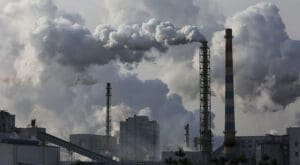
Ana Swanson of the New York Times wrote an article called Climate Change May Usher in a New Era of Trade Wars. The key point of the article is that legislation and policies aimed at fighting climate change could also further erode free trade.
“The new policies,” Ms. Swanson pointed out, “are pitting close allies against one another and widening fractures in an already fragile system of global trade governance.” On the other hand, “the current system of global trade funnels tens of millions of shipping containers stuffed with couches, clothing and car parts from foreign factories to the United States each year, often at astonishingly low prices. But the prices that consumers pay for these goods do not take into account the environmental harm generated by the far-off factories that make them, or by the container ships and cargo planes that carry them across the ocean.”
The World Trade Organization (WTO) has been a strong proponent of free trade. The WTO puts on the annual event in Davos Switzerland where CEOs from the largest multinationals rub elbows with elite politicians and famous thought leaders. But even the WTO understands new trade legislation is needed to foster a greener world. The Director-General of the WTO called for change during the recent meetings in January. “Because countries tend to impose higher tariffs on relatively clean finished goods, but lower tariffs on often more-polluting inputs and intermediates, trade policy skews in favor of dirtier products – resulting in an implicit subsidy for CO2 production of $550 billion-$800 billion per year,” she said. “Eliminating this bias,” Ms. Okonjo-Iweala added, “would reduce global carbon emissions by 3.6%.”
Green Tariffs and Subsidies
In recent months, the US and the European Union have introduced subsidies and tariffs to reduce carbon emissions. Other tariffs are being contemplated. Last August, President Biden signed the Inflation Reduction Act. This legislation includes $370 billion in tax credits for low-emission forms of energy to fight climate change. There are tax credits for consumers who buy American-made clean cars and generous subsidies for companies building new plants for solar and wind power equipment.
Last December, the Biden administration sent a proposal to the EU for the creation of an international consortium that would promote trade in steel and aluminum produced with less carbon. This would be achieved through the imposition of tariffs on steel and aluminum that would impact China and other countries that did not belong to the group.
Meanwhile, the European Union is moving toward the adoption of a carbon tax law “that would impose a tariff on imports from countries that fail to take strict steps to curb their greenhouse gas emissions.” This legislation would penalize the biggest emitters of planet-warming gases with the goal of helping to prevent a global climate disaster.
These kinds of policies not only reduce greenhouse gas emissions, they protect jobs in nations actively tackling climate change. Otherwise, there could be a race to the bottom where jobs migrate to nations that permit high levels of greenhouse gas emissions.
The trade wars that begun under Trump, and have continued under Biden, have already begun the process of eroding free trade and moving the world toward bilateral trading blocs. In this new world, democracies will increasingly do business with each other. Similarly, dictatorships and pseudo democracies will increasingly trade with each other.
In the past, free trade was breaking down because of concerns about China. When the US agreed to a free trade agreement with China in 1999, the theory was that as more and more Chinese entered the middle class China would become more democratic. That did not happen. What happened instead was massive theft of intellectual property, huge trade deficits, the hollowing out of the middle class in Europe and North America, and the rise of nativist politics.
Does Free Trade Even Make Sense?
The rhetoric around the Chinese tariffs of the last six years makes it easy to forget the philosophy that underpins free trade. Economists are generally supportive of free trade. There is a broad consensus among economists that protectionism has a negative effect on economic growth, subverts technological progress, and causes consumers to pay higher prices.
In terms of technological progress, for example, the rapid advances in wind turbine performance have accelerated because of free trade. Free trade allowed critical components of the turbines to be produced by different companies in different nations. Companies from around the world could focus their research and development in places where they could make the greatest advances – areas where they had comparative advantage.
What economists argue is that there is a right way to support a greener world and a wrong way. The right way supports, if not free trade, at least freer trade. The wrong way eliminates the advantages of the free trade regime. The right way uses carbon tariffs that account for the end-to-end carbon used to manufacture and transport goods around the world. A carbon tariff defines an explicit tax rate on greenhouse gas (GHG) emissions. A tax of $100 per ton of greenhouse gas emissions is often bandied about.
Conclusion
In the United States, according to Ms. Swanson of the New York Times, support is growing among both Republicans and Democrats for more “nationalist policies that would encourage domestic production and discourage imports of dirtier goods — but that would also most likely violate World Trade Organization rules. Most Republicans do not support the idea of a national price on carbon. But they have shown more willingness to raise tariffs on foreign products that are made in environmentally damaging ways.” There also appears to be an increasing convergence between Republicans and Democrats on the idea of using “trade tools to discourage imports of polluting products from abroad.”

















